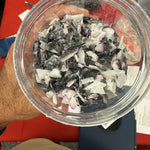Category: Recycled Material
Vendor:Polymer in Stock
HDPE Gas Tank Regrind is a high-strength post-industrial and post-consumer recycled material obtained from the shredding and grinding of used or rejected automotive fuel tanks. Manufactured from high-density polyethylene specially designed for impact resistance and chemical stability, this regrind is an excellent raw material for producing durable recycled HDPE compounds.
The material is processed through precision grinding systems to ensure consistent particle size, low contamination, and stable melt performance—making it suitable for a wide range of industrial applications.
Color – White and Black
Packaging – Jumbo Bag
Port of Loading - USA
QTY. – 20 Tones
Stock Availability – 150 MT/Month
Country of Origin: USA
Volume: Available consistent
Container loading: 20 and 40 Feet
Can export to – Any part of the world
Our Quality Assurance and Shipping Process
Material Guarantee We assure you that the material will meet the specifications of the loading pictures and the sample provided prior to shipment. Customer satisfaction and transparency are our top priorities.
Our Step-by-Step Process
- Quality Inspection:
- Before finalizing the shipment, our Quality Control (QC) team conducts a thorough inspection of the material to ensure it meets the agreed-upon standards.
- Detailed videos and pictures of the material are captured during the inspection and shared with the customer for approval.
- Container Booking:
- Once the customer approves the material, a container is booked on the next available vessel to ensure prompt delivery.
- The booking details, including the shipping schedule, are shared with the customer for tracking purposes.
-
Loading and Documentation:
- Material condition
- Loading procedure
- Container and seal numbers
- The material is carefully loaded into the container.
- During loading, we document the entire process with pictures and videos, capturing essential details such as:
- These visuals, along with the draft of the Bill of Lading (BL), are shared with the customer for verification.
- BL Draft Confirmation:
- The customer reviews and confirms the BL draft.
- Based on the confirmation, the Original Bill of Lading (OBL) is issued.
- A copy of the OBL is then shared with the customer.
Material Origin
Sourced from:
-
Automotive fuel/gasoline tanks
-
Industrial vehicle fuel reservoirs
-
OEM production scrap
-
Rejected blow molded gas tank components
These tanks are originally produced using cross-linked HDPE (XLPE) or high-performance HDPE blow molding grades, ensuring superior mechanical properties in the recycled form.
Key Characteristics
1. High Chemical Resistance
Designed to withstand long-term exposure to gasoline, diesel, and automotive fluids—this property remains intact even after recycling.
2. Excellent Impact & Crack Resistance
Gas tank-grade HDPE is engineered for:
-
High impact strength
-
Stress crack resistance
-
Outdoor durability
Regrind retains these characteristics for robust reprocessing.
3. Uniform Particle Size
Material is:
-
Cleanly ground
-
Screened for size consistency
-
Free from oversized pieces
Ensures smooth extrusion, injection molding, or compounding.
4. Low Contamination
-
Free from rubber hoses, metal parts, foam, or non-HDPE components
-
Fuel residue is minimized through cleaning and processing systems
-
Available as washed or unwashed based on requirement
Physical & Technical Specifications
-
Material: High-Density Polyethylene (Automotive Grade)
-
Form: Granulated / Flake / Regrind
-
Color: Mostly black (standard)
-
MFI (Melt Flow Index): Typically low (0.2–0.8 g/10 min) — varies by batch
-
Bulk Density: 300–450 kg/m³
-
Odor: Mild to none (post-cleaning)
-
Moisture: <1% (can be dried further if required)
RECENTLY VIEWED PRODUCTS



 +971 509205838
+971 509205838













